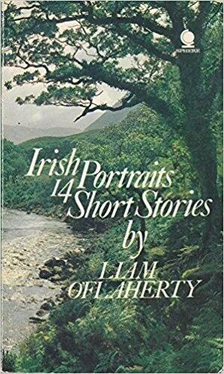He now looked at Byrne in a cheerful, friendly, patronizing manner, and he really felt that he had been a landowner and a horseowner all his life. Not only that, but he suddenly developed a suspicion, a momentary one, of course, that his ancestors had really been noble and that he was only coming into his own again. Ha! An aristocrat, by Jove! As good as the best of them and better.
“Now, yer honour,” continued Byrne, “I hope ye don’t take it bad of me accostin’ ye this way, but I’ve been out of work for six months through victimization. An’ if his honour Sir John Corcoran was alive today ’tisn’t here I’d be.”
“Oh! ho!” said Mr. Gilhooley.
He felt as if he had been a landlord and horse-owner all his life. Very pleasant sensation this; being solicited by a deserving poor fellow down on his luck. He mentally decided that Sir John Corcoran was the best of fellows, although he had never heard the name before. All this happened within Mr. Gilhooley’s mind during one second while Byrne prepared to continue his story.
The story was a long one, but Byrne told it rapidly, hinting at things and giving names of horses and calling public men by their nicknames. Mr. Gilhooley kept nodding his head until Byrne had finished.
“I’m very sorry,” he said, “but I’m afraid I can do nothing for you at the moment. Very sorry.”
“Thanks, yer honour,” said Byrne. “I know yer honour would if he could. But if he have any loose change to help a poor fellow along I wouldn’t mind mesel’ but the children. An’ indeed, yer honour, if Sir Joseph Corcoran was alive … thanks, yer honour, thanks…..”
Byrne uttered these thanks in anticipation, for he had seen Mr. Gilhooley’s hand moving slowly towards his right trousers pocket. The word of thanks hastened the movement of the hand. The hand entered the pocket and emerged with half a crown, which it dropped into Byrne’s outstretched hand.
“Another one to make a pair, yer honour,” cried Byrne. “Yer honour’ll never miss it, and a fine gentleman like yer honour needs only to be asked, I know. Sir John Corcoran, God rest his sowl, never drew less than half a golden sovereign out of his pocket to tip a man. He was the elegant gentleman, yer honour. Thanks, yer honour, thanks.”
Again Mr. Gilhooley’s hand entered his pocket. This time Mr. Gilhooley’s mind had again begun to grow suspicious, and he experienced the sensation of slowly recovering from a fit of drunkenness during which he had imagined himself a millionaire and had been flinging his money about. He dropped the second coin - it was a florin - into Byrne’s hand. Then he shrugged himself as if he had caught a chill, and set off at a smart pace. As he walked away he felt a shiver down his spine and knew that he had made a fool of himself.
Byrne did not look after him. He just spat on both coins, hitched up his clothes, winked one eye and said in a curious, melancholy voice:
“Jay, that fellah was an easy mark.”
The Fall of Joseph Timmins
It was Sunday evening. Mr. Joseph Timmins sat by his wife’s bedside. His wife, Louisa, who had become a confirmed invalid of late, was lying flat in bed, with her shoulders propped against pillows. She was reading aloud an article from The Irish Rosary. The article dealt with the “Persecution of the Church in Mexico.”
Although it was cold outside it was very stuffy in the room. The window was shut and there was a fire. Mrs. Timmins required a warm room for her ailment. It was the heat that first began to make Mr. Timmins discontented as he sat listening. Then the tiresome crackling of the fire made him feel bored and his winter underclothing, which he had just begun to wear, irritated his flesh. Finally he became aware of his wife’s rasping and sanctimonious voice and his heart poured out all its rebellious hatred against her.
He stole a glance at her lean, withered, spectacled face, at her clammy yellow hands, at her sunken undeveloped breasts, shaped like a flat board against the bedclothes and he realized acutely that he was fifty years old, without ever having been loved. So a pained dissatisfied expression came into his nervous face and he began to think of her with hatred. Until then he had listened to her reading without grasping the meaning of the words. Now he heard them acutely and hated them, their meaning and the persecuted Church, which represented his unhappiness. The Church was his wife, with her unsexed body and the spectacles on her nose and her horror of the marriage bed.
The sudden upheaval in his mind was all the more violent because it terrified his conscience and he was too weak either to act upon it or to repress it. Indeed he called weakly upon the Blessed Virgin to save him from this sin, but the devil of unrest and concupiscence held his paltry personality with in strong chains, so that he heard his thoughts actually shouting in his mind and he sat listening to them, incapable of resistance.
Indecent memories made him flush, and yet they made him hate her all the more and feel ashamed of his cowardice. He remembered how in the first year of their marriage, she had terrified him by her modesty. Yes, she had lain, twenty-five years ago, in that very same bed, their marriage bed. She had turned all the holy pictures to the walls, sprinkled him with holy water and begun to make an act of contrition when the marriage was about to be consummated. It was like being married to a nun or setting up house in a church.
And all these barren years, without children and even without sin…. The devil now suggested to his mind, shouted it out, that even sin, strong lustful sin, would have fertilized the arid desert of his life. It would have freed him from her clammy hands and her undeveloped breasts that were shaped against the bedclothes like a flat board.
And he himself … what was he? What did he look like in the mirror, one day after his bath, when he saw himself naked? A puny thin man with a beard streaked with grey, a nervous pale face twitching, eyes that had a monk’s woman-fear in them and bony thighs like an old man.
Word by word, slowly, she enumerated the tortures they were suffering, the bishops and priests of Mexico and her dry lips seemed to find pleasure in the recital of their suffering, in the laceration of their whipped flesh. For their loins had never known a woman. And he, listening, rejoiced wickedly, for those atheists were crashing through the walls of steel that had bound his cowardice and with imaginary bullets he slew hordes of bishops and dashed their gourds of holy water into cesspools and smashed the holy pictures with hammers and spat upon the tablets of contrition. He heard cries of lust and triumph and he mingled with the conquering atheistic soldiers, gouging the eyes of monks and violating nuns.
It was horrible. His irritated skin grew hot and moist with perspiration. He made a sound with his lips, like a hiss of pain. He clenched his hands together and stretched them downwards stiffly towards his thighs.
Suddenly his wife stopped reading, put the magazine on the bed and looked at him. She looked at him down her nose over her spectacles. Her eyes, shining through the fire-brightened glasses, were cold and cruel like the eyes of a miser. They had in them all the meanness and the cruelty and the aridity of perverted sanctity, the joylessness of the woman who has killed her mother instinct, the hatred of the parasitic soul that withers the sap of nature with its clammy touch.
“Joseph,” she said, in her dry, harsh, old-maid’s voice, “is it too much for you, dear?”
Her voice made him start, but he did not look at her. He merely relaxed his hands and let his body go limp. Her voice silenced the devilish voice of rebellion in his mind. Like an automatic machine his conscience registered a mortal sin, the sin of taking pleasure in obscene thoughts, Her voice made him feel conscious of her power over him and of his own weakness. Just as a schoolboy when he hears the voice of the Dean of Studies, remembers his lessons with fear; so Mr. Timmins remembered his work as a director of an insurance company and also the religious societies to which he belonged, especially the one for saving street women “from the scarlet sin of their unhappy life” as his wife called it. These labours and duties rose up before his mind, big and perpetually unfinished and it became obvious to him that life should mean nothing to him beyond these labours, for which he would be rewarded in the next world.
Читать дальше












